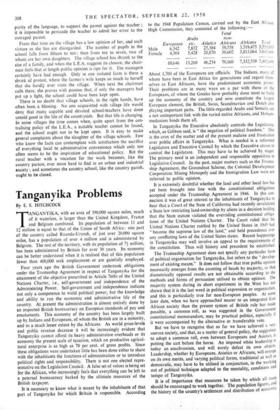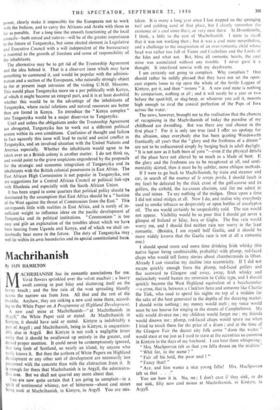Tanganyika Problems
By E. F. HITCHCOCK TANGANYIKA, with an area of 390,000 square miles, much of it waterless, is larger than the United Kingdom, France and Belgium combined. Its population of between 11 and 12 million is equal to that of the Union of South Africa : one part of the country called Ruanda-Urundi, of just over 20,000 square miles, has a population of over 4 million and is administered by Belgium. The rest of the territory, with its population of 7f million, has been administered by Britain for over 30 years. Its economy can be better understood when it is realised that of this population fewer than 400,000 seek employment. or are gainfully employed.
Four years ago the British Government undertook obligations under the Trusteeship Agreement in respect of Tanganyika for the attainment of the objective prescribed in Article 76(b) of the United Nations Charter, i.e., self-government and independence of the Administering Power. Self-government and independence indicate not only a competence to wield political power, but the knowledge and ability to run the economic and administrative life of the country. At present the administration is almost entirely done by an imported British bureaucracy on European standards of pay and emoluments. This economy of the country has been largely built up by Indians and Europeans, of whom the British are in a minority, and to a much lesser extent by the Africans. As world price-levels and public revenue decrease it will be increasingly evident that Tanganyika cannot afford its heavy administrative overheads or its economy the present scale of taxation, which on productive agricul- tural enterprise is as high as 70 per cent. of gross profits. Since these obligations were undertaken little has been done either to share with the inhabitants the functions of administration or to introduce political rights and responsibility. There is not one elected repre- sentative on the Legislation Council. A false set of values is being set for the African, who increasingly feels that everything can be left to a paternal bureaucracy backed by the ultimate resources' of the British taxpayer.
It is necessary to know what is meant by the inhabitants of that part of Tanganyika for which Britain is responsible. According to the 1948 Population Census, carried out by the East African High Commission, they consisted of the following :— Total Europeans Arabs etc. Asiatics non- Africans Africans Total Male 6,342 7,832 25,384 39,558 3,519,475 3,559,033 Female 4,304 5,428 20,870 30,602 3,813,064 3,843,666 10,646 13,260 46,254 70,160 7,332,539 7,402,699 About 1,700 of the Europeans are officials. The Indians, many of whom have been in East Africa for generations and regard them- selves as East Africans, have the predominant economic power.
Their problems are in many ways on a par with those of the Europeans, of whom the Greeks have probably done most to build up the economy of the country and now constitute the largest European element, the British, Swiss, Scandinavian and Dutch also playing important parts. The little-regarded Arabs and Somalis are a not unimportant link with the varied native Africans, and Moham. medanism binds them all.
In Tanganyika the Executive absolutely controls the Legislature. which, as Gibbon said, is " the negation of political freedom." This is the crux of the matter and of the present malaise and frustration over public affairs in Tanganyika. What is needed is a reformed Legislature and Executive Council by which the Executive ceases to control the Legislature. This may have to be achieved by stages. The primary need is an independent and responsible opposition in Legislative Council. In the past, major matters such as the Trustee- ship Agreement, the Groundnut Scheme, the Colonial Development Corporation Mining Monopoly and the Immigration Law were not referred to public opinion.
It is extremely doubtful whether the land and other local law has yet been brought into line with the constitutional obligations accepted under the Trusteeship Agreement in 1946. In this con- nection it was of great interest to the inhabitants of Tanganyika to hear that a Court of the State of California had recently invalidated a State law restricting land-ownership by aliens •in a decision holding that the State statute violated the overriding constitutional obliga- tions of the United Nations Charter. The Court ruled that the United Nations Charter ratified by the United States in 1945 had " become the supreme law of the land," and held precedence over any conflicting laws of the United States states. Recent happenings in Tanganyika may well involve an appeal to the requirements of the constitution. Thus will history and precedent be established.
The Trusteeship Agreement does not specify any particular form of political organisation for Tanganyika, but refers to the " develop- ment of existing means." It does not follow that true public opinion necessarily emerges from the counting of heads by majority, or that diametrically opposed results are not obtainable according to the methods and forms of persuasion utilised to obtain opinion. The majority system during its short experiment in the West has not shown that it is the last word in political expression or organisation. and this is particularly true for non-European peoples. At some later date, when we have approached nearer to an integrated East African society than the present system of British rule has made possible, a common roll, as was suggested in the Government constitutional memorandum, may be practical politics, especially if it were accompanied by the alternative or transferable vote.
But we have to recognise that so far we have achieved a very uneven society, and that, as a matter of general policy, the suggestion to adopt a common roll, even between Europeans and Asiatics, is putting the cart before the horse. An imposed white leadership is today an anachronism, and will surely defeat its own objects. Leadership, whether by Europeans, Asiatics or Africans, will emerge on its own merits, and varying political forms, traditional as well as democratic, may have to be utilised in conjunction, in the working out of political technique adapted to the mentality, conditions and tempo of Tanganyika.
It is of importance that measures be taken by. which all races should be encouraged to work together. The population figures, and the history of the country's settlement and distribution of economic power, clearly make it impossible for the Europeans not to work with the Indians, and to carry the Africans and Arabs with them as far as possible. For a long time the smooth functioning of the local councils—both mixed and natives—will be of the greater importance to the future of Tanganyika, but some elected element in Legislative and Executive Council with a will independent of the bureaucracy is essential to the growth of freedom and sense of responsibility of the inhabitants.
The alternative may be to get rid of the Trusteeship Agreement and the idea behind it. That is a clear-cut issue which may have something to commend it, and would be popular with the adminis- tration and a section of the Europeans, who naturally strongly object to the at present inept intrusion of the visiting U.N.O. Missions. This would place Tanganyika more on a par politically with Kenya, of which it might become an integral part, and it is at least doubtful whether this would be to the advantage of the inhabitants of Tanganyika, where racial relations and natural resources are better than are found in Kenya. To introduce the " Kenya complex " into Tanganyika would be a major disservice to Tanganyika.
Until and unless the obligations under the Trusteeship Agreement are abrogated, Tanganyika has to work out a different political system within its own conditions. Confusion of thought and failure to face squarely this issue will lead to racial and social conflict in Tanganyika, and an involved situation with the United Nations and America especially. Whether the inhabitants would agree to be taken over as a British colony is another matter. I do not think so, and would point to the grave suspicions engendered by the proposals for the strategic and economic integration of Tanganyika and its inhabitants with the British colonial possessions in East Africa. The East African High Commission is not popular in Tanganyika, nor are suggestions for a Central African Council or political link-ups with Rhodesia and especially with the South African Union.
It has been urged in some quarters that political policy should be dominated by the assumption that East Africa should be a " bastion of the West against the threat of Communism from the East." This corresponds little with realities in East Africa, and is surely of in- sufficient weight to influence ideas on the pacific development of Tanganyika and its political institutions. "Communism " is too easy and glib an explanation of the troubles about which we have been hearing from Uganda and Kenya, and of which we shall un- doubtedly hear more in the future. The duty of Tanganyika may _ well lie within its own boundaries and its special constitutional basis.







































 Previous page
Previous page